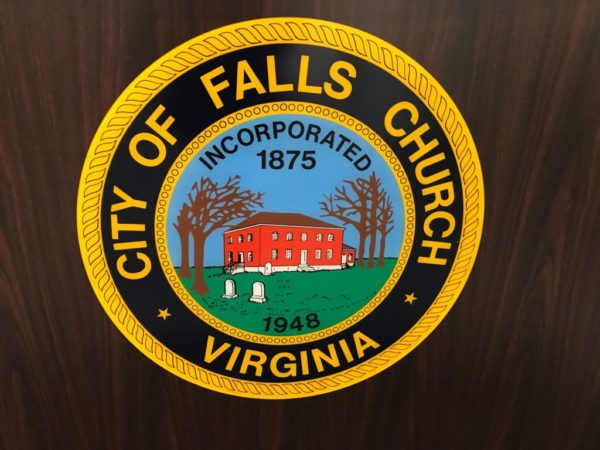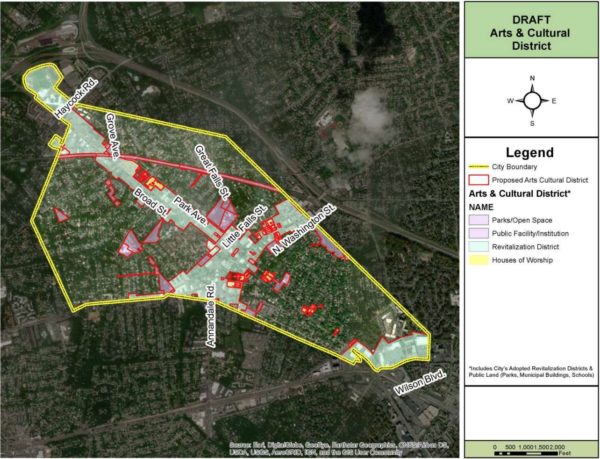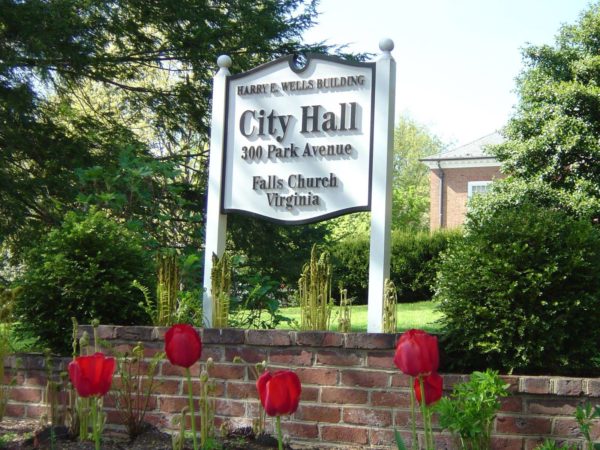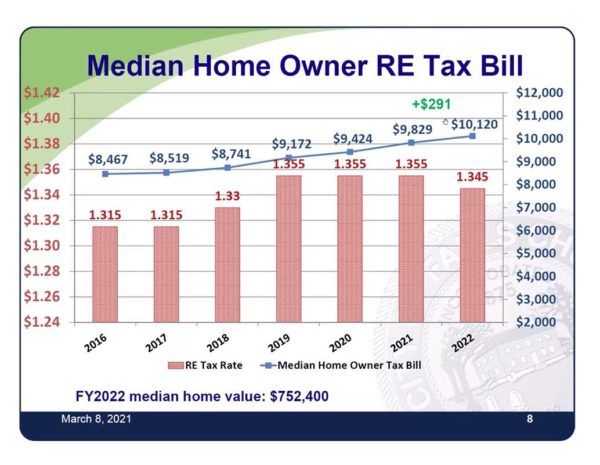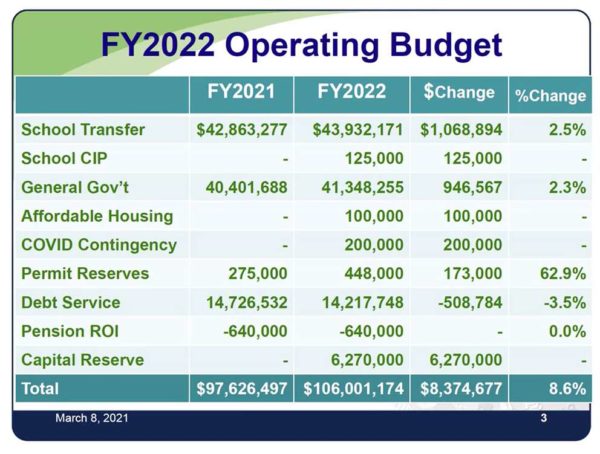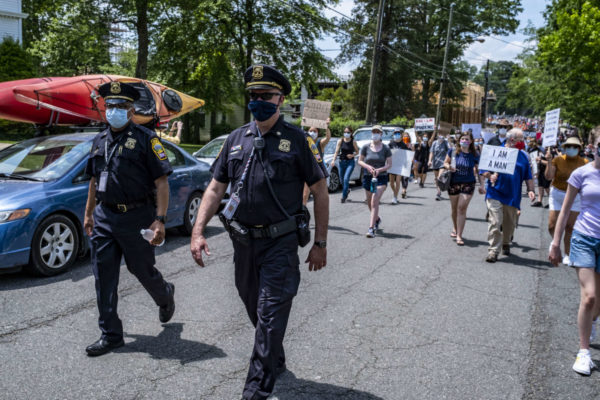(Updated at 2:40 p.m.) The Falls Church City Council approved a real estate tax rate reduction on Monday (April 26) in what councilmembers called a testament to the hard work and planning of the city staff — especially amid a pandemic that devastated the national economy.
Overall, the three-and-a-half-cent tax rate decrease comes despite a 2.3% growth in the city’s operating budget, which totals $41.3 million.
“The adopted budget includes a real estate tax of $1.32 for every $100 of assessed value, which is a decrease of $0.035 from the previous year,” the city said in a press release. “The general government operating budget is approved at $41.3 million, which is 2.3 percent growth over the previous year.”
The Falls Church City Public Schools budget was fully funded at $43.9 million — a 2.5% growth over the previous year.
“The last time we even contemplated lowering the tax rate was 2005,” City Councilmember Letty Hardi said. “It’s a pretty remarkable achievement.”
The city says the tax rate decrease was made possible through a combination of eliminating a contingency fund, cutting $340,000 in capital projects, and using $460,000 in funding from the Founder’s Row development as a downpayment on the city’s high school construction debt.
The city said the reasoning behind the capital project cuts is that many are expected to be eligible for federal grant funding starting next year.
It’s not all good news on the bill front, though. The stormwater utility rate is increasing by 2% — an average $5 increase for the average homeowner:
The Council also set a new stormwater utility billing rate of $18.72 per 200 square feet of impervious surface, an increase of 2 percent from the current rate. The increase would result in an approximate $5 increase for the average homeowner. The stormwater utility rate increase is needed to address increased investment in repairs and maintenance of the system. The Stormwater Task Force, convened by City Council in 2019, identified six major flood mitigation projects, which are in final engineering now. A financing plan to pay for these major projects will be finalized in the coming year.
Other items of note in the budget include $100,000 for the Affordable Housing Fund and body-worn cameras for police officers.
“The City Council understands that this has been a difficult year for a lot of people, including our taxpayers,” Mayor David Tarter said. “I am happy that we were able to lower our tax rate and ease the burden on our residents while maintaining our schools and critical City services. We are grateful to our community for helping us get through challenging time.”
The Falls Church City Council has set in stone its commitment to public art in the Little City.
City council members voted unanimously on Monday (April 12) to amend Falls Church’s comprehensive plan by adding a section supporting public art and establishing a public arts district. Now, staff will turn their attention to hammering out the details needed to carry out this committment.
The vote culminates about a year of work that involved various city groups that reviewed the policy and consultants from the University of Virginia who helped craft it, city planner Emily Bazemore said.
The proposed arts and cultural district will include commercial areas, public facilities, parks, and houses of worship, but it will not apply to residences. The map below shows where permanent and temporary art installations could be located.
Funding remains an open question for now.
Falls Church City already has a Arts & Humanities Grant Program that receives $44,000 in contributions from the city and $4,500 from the Virginia Commission for the Arts.
The program mostly funds operational expenses and programming, but nonprofit groups can apply for grants, city spokeswoman Susan Finarelli says. The grants are capped at $5,000 and conferred with the understanding that projects must be completed within the fiscal year.
“This is probably too small an amount for public art projects,” Finarelli said, adding that one fiscal year is “a quick turnaround time for public art.”
Councilmember Letty Hardi, who sits on the Arts and Humanities Council of Falls Church, said the city should consider whether it wants to use this grant program or seek out a different funding source. The program has not contributed to many installations, according to Hardi, who has raised questions about funding mechanisms in the past.
“If we want to implement these recommendations, we’re going to have to think about dollars against it too,” she said.
The comprehensive plan amendment recommends that the city devote annual funding from its operating or capital improvements budget to commissioning art or paying for arts-related festivals and events. It also has language for working with the private sector to include public art in development projects or provide monetary contributions to a public art fund.
“The funding will be considered later,” Finarelli said. “That may come in the form of a new grant program, or perhaps change the existing Arts and Humanities grant program. City staff will consider options and make a proposal to City Council. We do not yet have a timeline on that.”
In the meantime, projects like the West Falls development have committed to supporting public art in those spaces.
As part of the new public arts policy, the city will also launch a registry of local artists. This yet-t0-exist registry could live on the Arts and Humanities Council website, which would be responsible for updating it, Bazemore suggested.
“It’s a long-term strategy,” the city planner said. “It would track different artists who submit interest in working with the city from Northern Virginia or the D.C. area.”
Councilmember Marybeth Connelly had a number of questions about the registry and how it would be maintained but indicated an interest in the concept.
“I do appreciate the direction this is going, and I’m glad that we are going to move forward and be able to identify this arts and cultural district,” she said.
Images via City of Falls Church
The Falls Church City Council will get a staff briefing and presentation during its work session tonight (Monday) on a proposed One City Center mixed-use development just across the street from the still-pending Broad and Washington project.
The discussion is slated for 9:30 p.m., according to the meeting agenda.
Atlantic Realty Companies is proposing an extensive mixed-use apartment building with space for a grocery store and other retail space, as well as commercial and office spaces. The plan includes creating a new traffic circle at the intersection of S. Maple Avenue and W. Annandale Road and designing a Dutch-style “living street” called a “woonerf.”
According to a Falls Church City staff report, Atlantic is proposing to build a development over 4.6 acres at the intersection of W. Broad and S. Washington Streets that features:
- About 17,500 square feet of ground-floor retail
- A 26,500-square foot grocery store at the corner of Maple Avenue and Broad Street
- 13,365 square feet of retail and commercial space on the mezzanine level
- 43,000 square feet of office space
- 246 apartment units across six stories, 15 of which will be set aside for affordable housing
- 9-10 levels of structured parking with 969 spaces
About 75% of the complex will be dedicated to apartment living, leaving 10% for office space and 15% for retail. Atlantic is seeking a special exception from the council to have apartment units in the complex and allow for a 40-foot height bonus, which would bring the building to a maximum of 115 feet.
Atlantic currently owns and manages all the affected properties: the George Mason Square office complex and two-story parking garage, a BB&T Bank, Matt’s Tailor & Bridal Boutique on W. Broad Street, a vacant parcel at the corner of W. Broad Street and S. Maple Ave., and a five-story office building with a surface parking lot.
Atlantic’s commercial program is based on the need for flexibility to help drive foot traffic to the property, Andrew Painter, the developer’s legal representation, said in a letter to the city.
“Traditional format retail has been challenged in recent years by the rise in e-commerce, and COVID-19 has greatly accelerated this trend,” he wrote. “Similarly, the recent increase in virtual meeting services and the escalated pace of technology adoption is having deleterious repercussions on office demand.”
The existing George Mason Square arcade will be removed and replaced with a pedestrian plaza lined with new fast-casual eateries, retailers, and a pedestrian-oriented “woonerf” between the existing and proposed new buildings that may be periodically closed for special events and fairs, according to Painter’s letter.
This “woonerf” will have “high-quality pavers, overhead accent lighting, landscaping, hardscape treatments, and parallel parking for adjacent retailers,” he said.
Painter wrote that these changes will “anchor the project’s eastern entry, activate George Mason Square’s ground floor area, and provide an updated, modern signature asset to the City’s rapidly evolving downtown.”
He noted that Atlantic is proposing a 30 by 40-foot exterior visual screen, which can be used for “screen on the green” events or coverage of live city events.
Painter added that it “will also keep the George Mason Square development competitive from an aesthetic perspective which, in turn, will energize the Applicant’s leasing program and drive tenant demand.”
The grocery store, he said, will be “a new entrant to the City’s grocery store market.”
As for transportation, the project will include a proposed mid-block crossing and a high-intensity activated crosswalk signal on W. Broad Street.
Painter said the proposed traffic circle will “provide a safer intersection for pedestrians and will, in conjunction with the new public park on the Triangle Parking Lot, transform the intersection into a more attractive urban gateway.”
Photos via Falls Church City
Virginia to Further Ease COVID-19 Restrictions in April — “As COVID-19 vaccinations continue to rise in Virginia, certain sports and entertainment venues may begin to operate with additional capacity and indoor and outdoor gathering limits will increase starting Thursday, April 1…More than two million Virginians, or approximately one in four people, have now received at least one dose of the COVID-19 vaccine.” [Gov. Ralph Northam’s Office]
Fairfax County Board Adopts Resolution Condemning Anti-Asian Racism — The Fairfax County Board of Supervisors voted unanimously yesterday to adopt a resolution condemning “all bigotry, harassment, and hate violence directed at Asian Americans in our community.” The move came in response to the murder of eight people, including six Asian women, in Georgia on March 16 and reported increases in discrimination against Asians during the COVID-19 pandemic. [Chairman Jeff McKay]
Falls Church City Advertises One-Cent Reduction in Tax Rate — The Falls Church City Council voted 5-2 on Monday (March 22) to grant a first reading to the city’s proposed FY 2022 budget with a real estate tax rate of $1.34 per $100 of assessed value, a one-cent decrease from FY 2021. Public hearings on the budget, tax rate, and capital improvement program have been scheduled for April 12 and 26. [City of Falls Church]
Access to D.C. Cherry Blossoms Will Be Limited — “The National Park Service announced today it will be “limiting all vehicular and pedestrian access” around the Tidal Basin once the cherry blossoms start to bloom, which would close down access to parking and paddle boats as soon as this weekend…Pedestrians will still be able to access the Tidal Basin and admire the flowers, the agency said, until crowds surpass a certain capacity.” [Washingtonian]
Town of Vienna Revamps Website — “We have lift off on the Town’s new website!! Info has been streamlined, and navigation organized to be user-focused. On the homepage, scroll down to see links to popular pages, news items, calendar, and links to meeting minutes & media.” [Town of Vienna/Twitter]
Falls Church City could be getting a second phase of the Founders Row development project on W. Broad and S. West streets.
Developer Mill Creek Residential Trust is proposing a mixed-use apartment building with 319 units, ground-floor retail, and underground parking with 80 retail and 351 residential spaces. It would replace the vacant Rite Aid and carpet store at 1001 and 1003 W. Broad Street across the street from the first phase of Founders Row.
“It’s meant to complement phase one in the evolving downtown of the City of Falls Church,” Mill Creek representative Joe Muffler said during a Falls Church City Council meeting on Monday (March 15).
Mill Creek submitted an application for Founders Row II to the city in November. The developer anticipates finishing the first phase by next March and hopes to start phase two around that time, Muffler said.
The developer is seeking special exceptions to allow a 30-foot height bonus, which would make the development to 85 feet tall, and to build residential units in a mixed-use area.
Aiming for LEED Gold status, Founders Row II will have electric vehicle charging stations in the parking lot and plan for future solar panel installations. The developer also plans to put utilities underground and has committed to making street and sidewalk repairs.
Mill Creek plans to re-time signals and add traffic calming measures at the intersection of S. West and W. Broad streets. The project is projected to produce a net 3-4% increase in cars at peak hours, Muffler said.
A Falls Church City staff analysis says nearly 40 units could be set aside as affordable, which is “in significant excess of the ‘typical’ 6% of all units at 60% AMI.” The proposed contribution includes 6% at 60% AMI and 6% at 80% AMI.
The affordable housing unit contribution compensates for a lack of cash contributions, but the developer is willing to be flexible, Muffler said.
The larger-scale contribution also compensates “for not providing net new commercial square feet,” Becky Witsman, the city’s economic development division chief, said in a letter.
58 units will be restricted to residents 55 and older, bringing the total number of proposed age-restricted units to 134 across both Founders Row developments, Muffler said.
“We wanted to bring a thoughtful, diverse mix that brings new renters into the city, that isn’t just kind of one size fits all,” he said.
On Monday, Councilmember Ross Litkenhous commended Mill Creek for adding green space to the proposed project in response to feedback two weeks ago. He said it will help with connectivity to the neighborhood and the Washington & Old Dominion Trail, which passes the site to the north.
In addition to housing, Founders Row II will have 15,000 square feet of retail, 5,000 square feet of medical or professional offices, and a 5,000 square-foot community co-working space. Muffler envisions less experiential, more necessary retail occupying this space.
“We all know Founders Row phase one has lifestyle- and entertainment-heavy retail,” he said. “One thing that is never going away and gets set aside for ‘sexier’ uses is retail such as convenience marts, pharmacies, and dry cleaners.”
The retail will be recessed to provide outdoor seating that will be appealing in light of the pandemic, Muffler said.
Councilmember Letty Hardi said there was “a lot to like” about Mill Creek’s proposal but cautioned that recessed retail with pavilions does not always work. She also suggested adding a turn lane onto S. West Street, as traffic can back up to Madison Lane.
“I know that this will be a consistent point of feedback, as users have trouble turning onto West right now,” Hardi said.
Cases over Bijan Ghaisar’s Death Stall in Court — A federal judge assigned to oversee a criminal case and civil lawsuit against U.S. Park Police officers for the 2017 fatal shooting of McLean resident Bijan Ghaisar “has made no moves to hold any hearings on the cases or provide a pretrial briefing and discovery schedule.” The officers were indicted by a Fairfax County grand jury in October but are seeking to have the cases moved to federal court. [The Washington Post]
Statewide Tornado Drill Scheduled for Today — Virginia will conduct a tornado drill at 9:45 a.m. today (Tuesday) as part of its first-ever Virginia Severe Weather Awareness Week, which started yesterday and will last through March 19. The alert will be issued through NOAA Weather Radio stations as well as local radio, TV, and cable outlets. [Fairfax County Emergency Information]
Falls Church City Council Gives Initial Approval to New Noise Ordinance — The city council voted 7-0 to give a preliminary “OK” to a measure that would permit up to 75 decibels of sound up to 10:30 p.m. in business and industrial areas on Friday and Saturday nights. Dates for a public hearing and final approval have not yet been scheduled. [Falls Church News-Press]
Fairfax County Chairman Criticizes Proposed Metro Cuts — Board of Supervisors Chairman Jeff McKay says that Metro’s proposed fiscal year 2022 budget would be “frustrating and could be harmful in both the short- and long-term to Metro and our Northern Virginia economy,” especially in Tysons. Federal relief funds are expected to stave off the cuts, but they have not been officially taken off the table yet. The public comment period ends today at 5 p.m. [Inside NoVA]
James Madison High School Kicks off Renovation — “We have officially kicked off renovation season! Fencing was installed in our main parking lot today. Changed traffic patterns and relocated parking spaces are just the start of what spring will bring us!” [@JamesMadisonHS/Twitter]
McLean Private School Rallies Support for Food Drive — Students, parents, faculty, and staff at The Langley School all chipped in for a three-week food drive to support the D.C. nonprofit So Others Might Eat. The effort produced more than $5,000 in monetary contributions and more than 2,000 donated non-perishable food items. [Sun Gazette]
Following in the footsteps of his Fairfax County counterpart, Falls Church City Manager Wyatt Shields is proposing a one-cent reduction in the real estate tax rate as part of the city’s advertised fiscal year 2022 budget.
However, because of rising assessed values, the average homeowner will still experience a $291 increase in their tax bill next year.
Presented to the city council on Monday (March 8), the advertised budget increases city government operating expenses by 2.3% (or $946,567) and public schools funding by 2.5% (or just over $1 million).
“With vaccines rolling out, and springtime in the air, we need to maintain vigilance but certainly have optimism toward the future — and hopefully, this budget reflects that as well,” Shields said.
Falls Church City School Board Chair Shannon Litton called the proposed $1 million funding increase for FCCPS “a bit better than we expected, given COVID-19.” The school division will also be receiving an additional $20,000 from the state and $31,000 from the federal government, she said.
Shields said the budget keeps revenues in line with forecasts from December without proposing a larger increase on residential real estate taxpayers. The city saw year-over-year increases in taxes on groceries and online sales, but a large decrease in revenue from hospitality taxes.
Highlights of the budget include funding for:
- $145,000 for body-worn cameras and civilian positions to support the department, which is a first step in addressing recommendations from the Use of Force Review Committee
- $200,000 in coronavirus contingency funds to address uncertainties, either revenue shortfalls or increased demand for services and assistance
- $150,000 to develop a Parks Master Plan
- $100,000 for the Affordable Housing Fund to supplement the $3.75 million Amazon REACH grant funds and leverage future developer contributions.
Shields has also proposed increasing stormwater management rates by 2%, or $4, for a median homeowner to pay for projects intended to address smaller-scale nuisance flooding. He anticipates that the city will need to increase rates by 10 to 15% for the next five years to fund six larger-scale stormwater management projects.
The advertised budget gives Falls Church City employees a 3% merit compensation increase, and a 3.5% step increase to uniformed police staff, but Shields told the city council on Monday that this small-scale growth is not sustainable in the long-term.
“My budget guidance for six years in a row was to keep non-personnel expenses flat,” he said. “So, it is really important to emphasize that after six years in a row of doing that — in addition to cuts made last year due to COVID-19 — our budgets are extremely lean.”
The city has about $3.94 million in unfunded needs across all departments, he said. These range from adding positions, including police officers, IT staff, and economic development staff, to maintaining public amenities, such as basketball and tennis courts and athletic fields.
Other highlights include:
- A $500,000 decrease in debt service, as due to the cancellation of planned debt issuance during the current fiscal year and refunding prior bonds from 2013 and 2011 at lower interest rates.
- A $4.5 million transfer from the 10-acre land at the George Mason High School campus to capital reserves.
- Anticipated concessions from Founders Row for $1.8 million, which will also be placed in capital reserves.
In addition to flood mitigation, other public safety spending includes investments in sidewalks, paving — which Shields said has been underfunded since the Great Recession — and neighborhood traffic calming activities. State grants will pay for improvements to the Park Avenue “Great Streets” project, the Oak Street Bridge and the Washington and Columbia intersection.
The city will also receive funding through the Biden administration’s American Recovery Act.
“That congressional aid [is] needed and necessary, and we will use it very well for infrastructure and capital needs,” Shields said.
Community members will get a chance to learn about the budget and share their comments at a town hall from noon to 1:30 p.m. on Thursday (March 11). Budget meetings will be held on March 22 and April 12, and there will be a second town hall on April 15 before the city council is slated to adopt the budget on April 26.
Photo via City of Falls Church Government/Facebook, charts via City of Falls Church
The City of Falls Church is taking steps to show its appreciation for the arts.
When it meets tonight (Monday), the Falls Church City Council will conduct its first reading of a draft comprehensive plan amendment to establish an Arts and Cultural District. The council reviewed staff recommendations for the proposal at a work session last week.
The amendment would “add new policy goals and objectives to promote public art and a proposed Arts & Cultural District Map,” according to the staff report presented by Falls Church City planner Emily Bazemore.
“Public art is important in all communities and becomes even more so when a city goes through a period of redevelopment and reinvestment,” Bazemore said. “The policy…outlines specific short-term actions as well as long-term strategies that the City of Falls Church can utilize to work towards its vision and commitment to public arts.”
Virginia state law lets localities create arts and cultural districts within their boundaries “for the purpose of increasing awareness and support for the arts and culture.” Localities can offer tax incentives and regulatory flexibility to encourage the development of arts and cultural venues in the districts.
Since it was reviewed during a Sept. 21 city council work session, the proposal has been amended to clarify the Falls Church’s vision and emphasize providing more support for local artists. The changes were based on input from various city groups, including the Falls Church City Planning Commission, Arts and Humanities Council of Falls Church, and Falls Church Village Preservation and Improvement Society (VPIS).
“The Arts and Humanities Council as well as VPIS and the Historical Commission all recommended adding language that ties into how history plays an important role in public art and how we can use public art to utilize a way to remind us of our past,” Bazemore said.
The map for the proposed Arts and Cultural District has been revised to include houses of worship. The Arts and Humanities Council and VPIS specifically recommended St. James Catholic Church and The Falls Church Episcopal as examples of church-owned land that could be incorporated.
In addition to creating an arts district, the proposed comprehensive plan amendment suggests that Falls Church support public art by establishing a registry, expanding efforts to feature temporary art displays, and incorporating public art in parks and open spaces around the city.
The amendment recommends that the city support a public art program by allocating regular funding from its operating or capital improvements budget each year, which could also go toward arts-related festivals and events. Another option could be working with the private sector to include public art in development projects or provide monetary contributions to a public art fund.
Bazemore clarified that the amendment text does not apply to private residences.
“The thought is more commercial and, of course, public facilities and parks,” she said.
While the staff report says adopting the amendment will not have a direct fiscal impact, Councilmember Letty Hardi argued that, if Falls Church wants to encourage public art, the city will have to devote money and staff to make it a priority.
According to Hardi, the City of Falls Church currently allocates just $50,000 per year to nonprofit arts and humanities groups, funds that mostly go toward operations rather than artwork. It also does not have any staff dedicated to developing art projects.
“Policies and recommendations are only as good as where we put our budget and our priorities,” Hardi said. “So, while it’s good that we have our map and we’re talking about how important public art is, I’d love to make sure that we have people and budget dollars allocated against this…I think that’s something we should consider either in this budget cycle or future budget discussions.”
After tonight’s meeting, the proposed amendment will be referred to the planning commission. Staff has recommended scheduling a public hearing and final vote for March 22.
Image and map via City of Falls Church
The City of Falls Church should establish independent processes for reviewing use-of-force incidents involving police officers and sheriff’s deputies, a committee tasked with evaluating the community’s relationship with local law enforcement found.
In a report released on Feb. 10 and reviewed by the city council last night (Monday), the Falls Church Use of Force Review Committee recommended that the city create a citizen review board and identify an outside organization to manage internal affairs investigations by the City of Falls Church Police Department and Sheriff’s Office.
“The implementation of an independent review of use of force incidents will mitigate the potential risk inherent in the current system,” the committee said in its report. “An independent finding will not face the same level of legal challenges or public scrutiny because the process will be clear, the reviewers will not be in the officer’s supervisory chain, and the board will be transparent.”
The Virginia General Assembly passed legislation during its special session last year giving localities the authority to establish civilian bodies with oversight over local law enforcement agencies, though the law will not officially be effective until July 1.
If Falls Church pursues the review committee’s recommendations for independent oversight, it would follow in the steps of Fairfax County, which created an independent police auditor and civilian review panel in 2016 to evaluate select Fairfax County Police Department investigations.
The committee also recommends that the City of Falls Church allocate funds to increase staffing for the police department, noting that the agency has contained about 33 positions since the 1970s despite a roughly 56% rise in the city’s population in recent years, including a nearly 20% increase between 2010 and 2019.
In addition to adding more full-time officers, the report suggests hiring a full-time certified trainer who could help train police officers and sheriff’s deputies on use-of-force practices and procedures, bias reduction and restorative justice, and management of situations involving vulnerable populations, such as individuals with mental health challenges, people with disabilities, and non-English speakers.
The committee argues that failing to staff law enforcement and public safety agencies at levels commensurate to the population they serve “is a significant risk,” resulting in personnel who have less time to train and receive insufficient organizational support to perform their duties.
Other recommendations in the report include: Read More
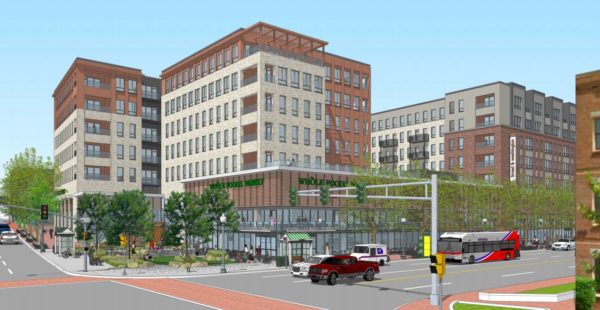
The Falls Church City Council took a notable step earlier this week in its effort to increase affordable housing.
The city council unanimously approved a resolution on Monday (Feb. 8) to reduce some of the voluntary concessions attached the city’s Broad and Washington mixed-use project in exchange for a commitment from the developer Insight Property Group to provide more affordable housing.
“I’m very excited about this project,” City of Falls Church Mayor David Tarter said. “The possibility of having increased affordable housing and raising the bar in that area is one I think is very exciting for our community.”
In its initial voluntary concessions agreement, Insight said that 18 of the 339 residential units planned for Broad and Washington would be available for below market value. Nine studio efficiency units would be at prices affordable for households making 40% of the area median income (AMI), and the remaining nine would be two-bedroom units for households making 60% AMI.
The voluntary concessions agreement also included an option to trade off other cash proffers that were proposed for schools, stormwater funds, and Bikeshare facilities, as well as a concession for libraries and park and recreation.
The newly approved resolution permits city staff to ask for 15 additional affordable studio units at 80% AMI, making 10% of the units in the Broad and Washington project available at some level of affordability below market rate, according to City Manager Wyatt Shields.
“What we’re getting in Broad and Washington is probably the richest mix and largest contributions in [voluntary concessions] across the board,” Councilmember Letty Hardi said. “So, while we can always do better, I do want to make sure people understand that we are getting a lot from this project.”
The resolution reduced Insight’s funding obligations to school capital costs by $2.3 million and to libraries and parks and recreation by $153,000 to allow for the increase in affordable housing.
While the project received unanimous approval, Councilmember David Snyder voiced concern with the manner in which the additional affordable housing was procured.
“My preference had always been that we not rob Peter to pay Paul, that we would add this on and use our leverage with developers,” Snyder said. “I want folks to understand that, yes, I support an increase in affordable dwelling units. This is not at all my preferred or desirable approach to funding them. I think we had other opportunities that were not taken.”
The Falls Church Planning Commission gave its support to the Broad and Washington project on Dec. 2 after a public hearing, but the group encouraged the city council to explore options for adding more affordable housing to the mixed-use development.
The city council voted on Jan. 25 to approve a comprehensive plan amendment, special exception, and the sale of a parking lot on Park Place to pave the way for Insight’s project.
The development plans call for a 56,000-square foot grocery store — likely Whole Foods — on the ground floor and mezzanine levels. At least 6,500 square feet of ground-floor space will be dedicated to other retail, sales, and restaurants, while 5,000 square feet has been set aside for the arts group Creative Cauldron.
A site plan for the development is expected in June, according to Shields.
Image via City of Falls Church


